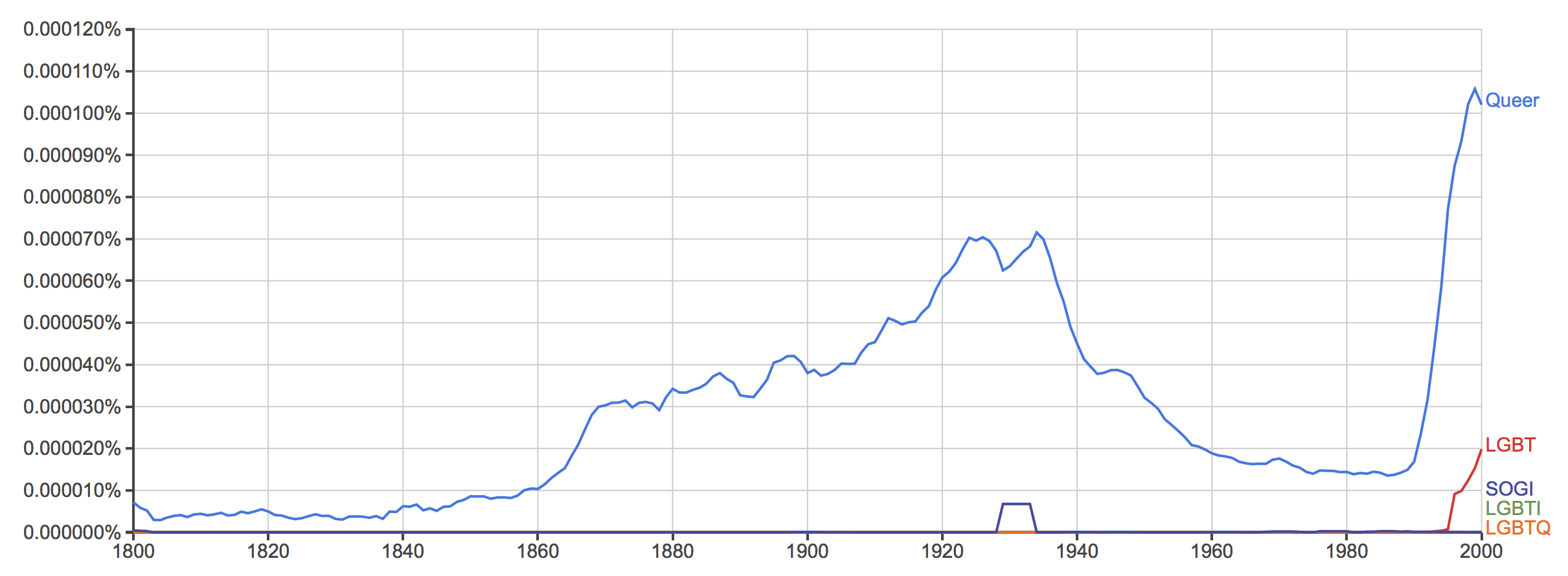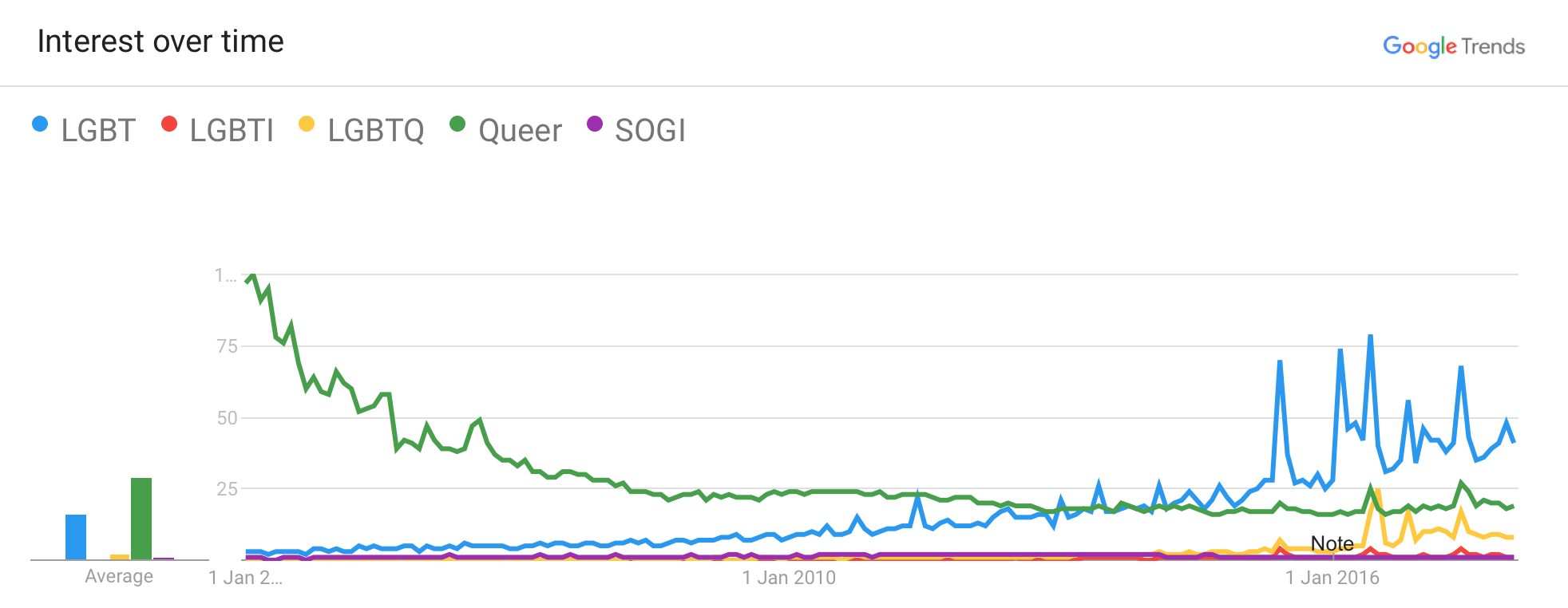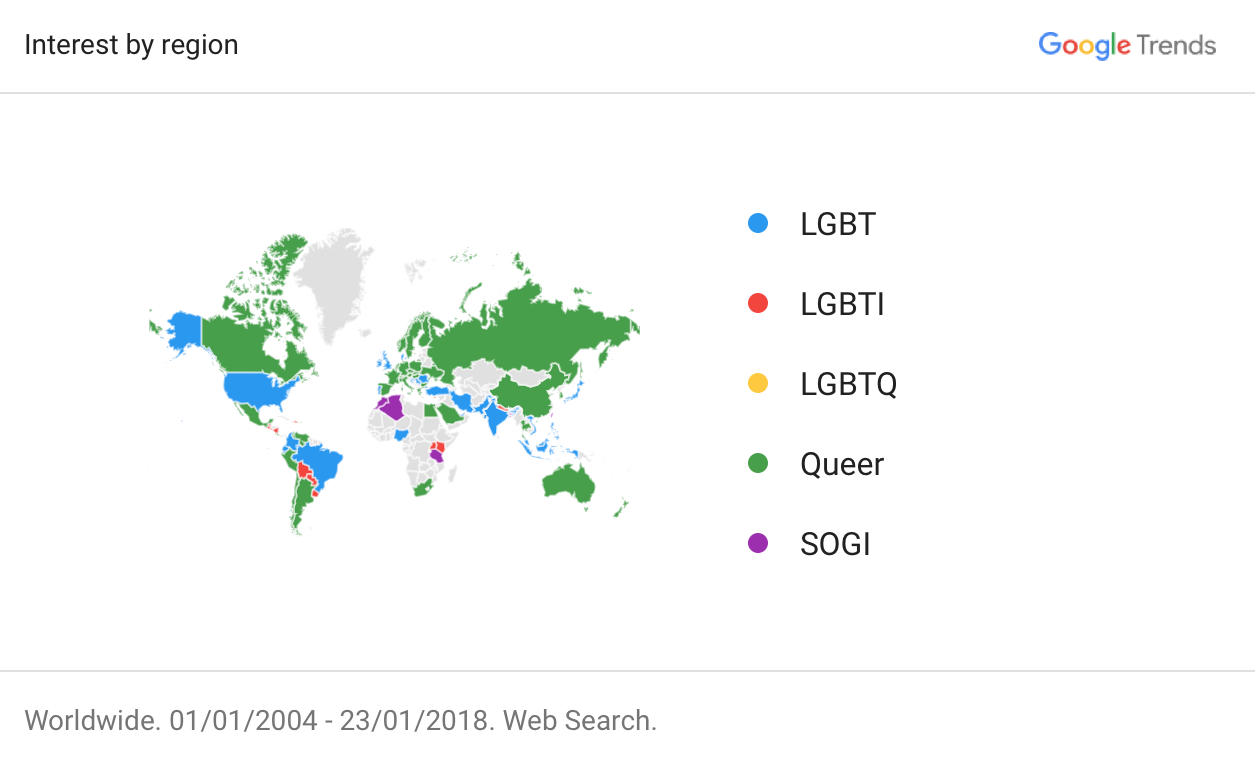There are a lot of collective terms1 used to describe people with minority sexual orientations and gender identities. If people are familiar with any terms at all, I would guess most people know about the acronym LGBT — which stands for ‘lesbian, gay, bisexual and transgender’.
Sometimes you also see variants on that acronym. LGBTI, with the I meaning ‘intersex’; LGBTQ where Q means ‘queer’ or ‘questioning’. Sometimes people add a plus or a star to denote those who don’t use one of those labels but, nonetheless, aren’t straight or cisgendered. Some people just opt for ‘queer’ to avoid acronyms entirely. These acronyms are usually followed up by the word “community”.
In international academic and non-government organisation circles, the acronym à la mode is SOGIE or SOGIESC. The former meaning ‘sexual orientation, gender identity and expression’ and the latter being that plus ‘sex characteristics’. They use phrases like “SOGIE minorities”2.
Whatever way you choose to describe the collective, it’s a subject of fierce debate. Using big data, we should be able determine which terms are most widely understood by most people, most of the time, and settle the debate.
A term that reflects the language we use
The language we use choose when talking about SOGIE minorities reflects our own identities. I identify as gay; so I use that label, and I use the label LGBT because it represents me. I don’t identify as queer and I rarely, if ever, would use the term “queer communities”.
Our language choices also reflect how we understand what we’re describing. Lots of people don’t know what being ‘two-spirited’ means, so they probably don’t use LGBTQ2S as their acronym; but they might know to say a two-spirit person is LGBT.
This implies there is a common denominator to our use of language in relation to SOGIE minorities. If that’s a correct assumption, it should be observable; and what we observe, whilst not right for everyone all the time, should be the right term for most people, most of the time.
Ngrams and search terms
If we want to observe the language people actually use, there is one place that, helpfully, aggregates the sum of human knowledge everyday: Google.
Google can help answer this question in two ways. It has:
- made the data about what people are searching for available through Google Trends
- catalogued hundreds of thousands of books since 1800, and made them searchable through the Ngram Viewer
Using these two sources, I’ve looked for the terms LGBT, LGBTQ, LGBTI, Queer and SOGI to see which are the most popular over time.
What the books say
At the time of writing, Google’s Ngram Viewer covers books printed between 1800 and 2008. The chart below shows the frequencies of the search terms across all books in Google’s corpus, as a percentage of all words in the corpus.

1. ‘Queer’ is clearly the most popular
Across the whole corpus, the term Queer appears most frequently. This could be because queer has multiple meanings3, but the Ngram viewer is case-sensitive and I was searching for the capitalised form (Queer as opposed to queer). Some erroneous entries likely remain — like if an author used queer as the first word in a sentence — but it vastly outstrips the use of other forms.
2. ‘LGBT’ is very recent
The term LGBT doesn’t appear in the corpus until at least 1976, making up just 0.0000000366% of all words in the corpus. The term LGBTQ makes an appearance in the early 1980s, and LGBTI doesn’t appear until 1995.
3. ‘SOGI’ is unexpectedly popular
References to SOGI appear as far back as the 1920s, and can be found throughout the corpus from that point. It’s not until the early 1990s that SOGI is overtaken by other acronyms like LGBT.
If you were basing a choice purely on the books people printed since 1800 in some form of English, then ‘Queer communities’ might be the collective term of choice.
What Google Trends shows
Google’s Trends tool allows us to look at search term data since 2004. Whilst this isn’t all the way back to the start of the Google search engine, it’s pretty close.
The graph below shows, from 2004 to present, the relative popularity of terms people actually used when searching on Google.

1. LGBT is currently the most popular search term
The search term Queer was overtaken by the search term LGBT in 2013. LGBT is twice as popular as a search therm than Queer, though Queer is still more popular than other variants, such as LGBTI and LGBTQ.
2. ‘Q’ is more common than ‘I’
Perhaps due to the popularity of Queer as a search term and word in common use, LGBTQ is around 7 times more popular as a search term than LGBTI.
3. SOGI is virtually non-existent
Unlike the Ngram corpus, SOGI very rarely appears as a term. This likely speaks to its niche use in academic texts compared to language use amongst the general population.
4. The use of language varies between countries
As you might expect, the most popular terms in different countries are, well, different. Canada, Mexico and mainland Europe tend to search for Queer whereas the US and UK tend to search for LGBT.

Broadly speaking, if you look just at the UK’s data, it mirror the global trends for language use overall; though the use of Queer is less common than it is worldwide.
5. ‘Queer as Folk’
“Queer folk” and “Queer as Folk” are the most common related queries when searching for the term Queer. The prevalence of the latter may indicate that its use is over represented in this data, as people were looking for a TV show (albeit a related one).
So what’s the answer?
As with all things in life, it appears the answer is “it depends”. If you’re going strictly by the numbers, it would appear that Queer is the most popular global term to refer to SOGIE minority communities. But those figures are skewed in two important ways.
Firstly, there are unknown numbers of erroneous occurances of the word Queer in the data - like where ‘queer’ means something else in the context it appears, or because of ‘Queer as Folk’. It’s entirely possible that Queer was never the most popular term, it just appears most frequently in a different context.
Secondly, and seemingly too obviously: not many people get to publish books. If you judge the content of books as representative of everyday language — whenever they were published — you’re probably wrong. More weight should arguably be given to search terms now, than to word counts from books. That’s because they represent what people actually say — or, more accurately, type — to Google.
The question of balancing these competing sets of data then comes down to your own judgment. In my view search data represents a broader base of language; Queer has, on those terms, had its day.
So, what do you call a collective of lesbian, gay, bisexual and transgender people? The answer, according to Google, is “LGBT” people.
Footnotes
By “collective terms” I don’t mean collective nouns. A related fun fact though — for gay people, the collective noun is a “village”. That gives a whole new meaning to this and this ↩︎
For brevity, and reasons that will become clear, I’m going to use “SOGIE minorities” in place of LGBT, LGBTI, LGBTIQ, Queer or any other associated term in this blog post. ↩︎
For example, aside from references to SOGI minorities, Google defines queer as:
Queer (adjective): Strange. Odd. “She had a queer feeling they were being watched”.
Queer (verb): to spoil or ruin. “Reg didn’t want someone queering the deal at the last moment”. ↩︎